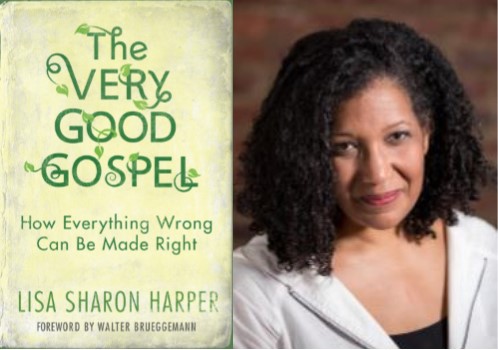Good News to Change the World: An Interview with Lisa Sharon Harper
Lisa Sharon Harper is a follower of Jesus calling all followers of Jesus to love every person the same and seek their flourishing. PneumaReview.com speaks with her about her story and how God is inviting each of us to participate with him in making his Gospel of Peace real in our communities today.

PneumaReview.com: Please share with us some of your story. Where are you from? What Christian traditions do you most identify with? What have you been involved with for which you are most grateful to God?
Lisa Sharon Harper: To know me you must know my ancestors. God laid the foundations of who I am through them.
As a teenager, my mother was a member of the Philadelphia chapter of S.N.C.C. (Student Non-Violent Coordinating Committee) in the mid-1960s. Her job was to connect Stokely Carmichael and others, such as James Farmer, with churches to speak in when they came through town. Her branch of our family tree reaches through the great northern migration, to enslaved and indentured family members in Maryland, Virginia and South Carolina as far back as 1650. Great grandfathers and uncles fought in every war this nation has ever seen; from the Revolutionary War through the Civil War to World War I, World War II, Korea and Vietnam. And one branch of the family, the Fortens of Philadelphia, served as primary financial backers of the abolitionist movement and helped build and lead the very first women’s equality gathering in Philadelphia in
My father was a member of C.O.R.E. (Congress of Racial Equality) in New York City. He attended the meeting where Freedom Summer participants were introduced: They were about to head to Mississippi to help register black Mississippians to vote. My father was considering joining Freedom Summer, but realized he needed to stay back and work for the summer. He met Andrew Goodman and Michael Schwerner at that meeting. My father’s father emigrated to the U.S. as a child joining his family in the South Bronx in New York City. They had arrived in waves over a period of years, directly following the United States’ annexation of the island. The earlier generation hailed from St. Kitts/Nevis where they were likely enslaved in extremely poor and brutal conditions. My great grandfather and his brother island-hopped looking for work throughout the turn of the century. His brother found work in Panama, building the canal.
My father’s mother was the daughter of an itinerate preacher who preached in all fifty states, according to family lore. She told me her father was college educated in British Guyana at the turn of the 20th century. Most of her family, in fact, were college educated business people, she said. While the question of how black men were college educated businessmen in British Guyana at the turn of the century remains unclear. The Census revealed one clue: that my great grandfather was born in Holland and lived in a Dutch quarter of a French section of British Guiana.


